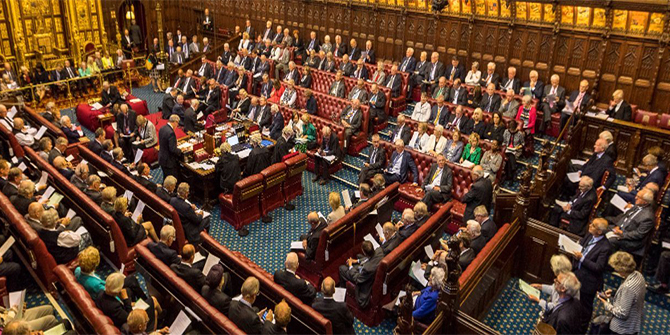
 Barack Obama’s uniquely participative 2008 campaign for the American presidency, prompted progressive parties around the world to learn new lessons. Now, after the rise of the radical right Tea Party movement, and Democrat setbacks at the 2010 American mid-terms, it is clear that liberals enjoy no monopoly on the combination of de-centralized grassroots activism and innovative technology. Nick Anstead and Will Straw update their previous advice to Labour on reviving the party by strengthening ‘low engagement’ contacts. Labour’s key challenge still remains to let go of its top-down, monolithic structures, in order to reach out to millions of new supporters and once again lead progressive politics in Britain.
Barack Obama’s uniquely participative 2008 campaign for the American presidency, prompted progressive parties around the world to learn new lessons. Now, after the rise of the radical right Tea Party movement, and Democrat setbacks at the 2010 American mid-terms, it is clear that liberals enjoy no monopoly on the combination of de-centralized grassroots activism and innovative technology. Nick Anstead and Will Straw update their previous advice to Labour on reviving the party by strengthening ‘low engagement’ contacts. Labour’s key challenge still remains to let go of its top-down, monolithic structures, in order to reach out to millions of new supporters and once again lead progressive politics in Britain.
In Yes We Can, written for the Fabian Society, we drew some immediate lessons from Obama’s successful presidential campaign for British political parties, especially the Labour Party – drawing on direct involvement in the US campaigns and academic research on the evolution of political communication and organization on both sides of the Atlantic. Key developments have included the massive increase in fundraising, using canvassing and voter identification techniques to better manage volunteers, and the use of digital media.
For British politics we concluded that:
- Obama’s campaign held lessons for all politicians, especially for those engaged in progressive politics.
- However, ideas from US politics cannot simply be grafted onto institutions in other parts of the world. Obama-style approaches were clearly not a quick fix for the Labour Party.
- Instead, we needed wholesale cultural and institutional adaptation to recognize that more pluralist and less hierarchical forms of social associations are developing.
In early 2009 our edited volume The Change We Need gathered together essays from British and American political practitioners on key aspects of the Obama campaign, including fundraising, managing volunteers, the use of data, and the role of Web 2.0 social media – with a foreword by the then Prime Minster, Gordon Brown. Our conclusion grounded the institutional evolution of British political parties in the dominant socio-political arrangements of different periods.
The problems that Labour experienced in the 1980s from the declining and more rebellious membership created by the weakening civic ties of post-industrial society, lead to the subsequent centralization of power in the hands of the leadership and a new organizational ideology under New Labour. This was a rational response to the previous problems, but paradoxically quickly began accentuate the very problem it looked to address – making Labour members feel cut off from decision making within the party, and triggering falls in membership.
The modern Labour Party needs to develop institutions that are genuinely democratic, encourage a broad cross-section of society to take part in politics and, above-all, appropriate to the socio-political epoch in which we now exist. Crucially, both old Labour and New Labour models of party organization cannot work. The ‘Old Labour’ model – based on a very formal and hierarchical model of decentralization, and institutions such as the constituency party, compositing motions, and party conferences – is too inflexible and exclusive to engage many modern citizens. Trying to resurrect or revive such institutions today would only act as barriers to participation and could not be genuinely democratic. Even in the 1950s, the trade union block vote proved to be a powerful tool for the party leadership, while in the 1980s organised entryism undermined the party’s democratic structures. But equally New Labour’s model was overly centralized, placing too much power in the hands of the leadership. It worked in the 1990s, but now looks increasingly out of place in an internet-enabled world where new technologies open up new modes of participation for citizens.
Our key suggestions were to follow Obama’s lessons by radically lowering the barriers to participation in Labour Party politics by:
- Scrapping mandatory subscription rates for members, and instead fundraising primarily through donation drives.
- Creating channels that enable dissent and debate, rather than seeking to stifle it – a form of cultural Glasnost within the party.
- Giving Labour supporters far better tools to self-organise, both online and offline.
- Keeping supporters much better informed, in order to build a relationship with them.
- Rewarding hard work and political entrepreneurialism within the party, and considering a move towards open primaries that could bring a new pool of talent into the Parliamentary Labour Party.
In 2010, have these Obama lessons lasted?
On both sides of the Atlantic, conditions have now changed a lot. President Obama’s approval ratings have suffered a greater drop than any previous president during their first two years in office – although it should be noted his current rating is still higher than was Ronald Reagan’s or Bill Clinton’s at the same point: Obama’s ratings have just fallen from a higher point. In the US mid-term elections, the Democrats lost control of the House of Representatives and suffered losses but clung on in the Senate. The rise of the Tea Party movement clearly demonstrated that the US left has no monopoly on social-movement style party politics, and that opposition to state intervention has mobilized voters too. In the UK too, Labour posted its second worst share of the vote since 1918 at the 2010 general election, and of course the Conservative-Liberal Democrat government is a new conjuncture, for Labour’s fresh and relatively inexperienced leader, Ed Miliband, to cope with.
Given these changes, were we a bit over excited by the Obama campaign’s parallels for Britain? We don’t think so – the fundamental lessons still hold true. First, look at the American development. The Democrats’ slump in the midterms and the emergence of the Tea Party can be interpreted in two ways. An easier and more reactionary understanding would argue that these reverses prove Obama’s 2008 campaign to have been all along a triumph of marketing over substance, creating only an evanescent and unsustainable political organization. However, there is a more plausible second reading – namely, that the US right has also adopted low-threshold, participatory organizations, changing the way we do politics, so that institutional adaptation to this new reality is even more urgently required. The Tea Party’s success must not be used as an argument against progressives adopting more open structures of political organizing – instead it double underlines how vital it is to move away from anachronistic organizational structures and cultures.
Recent events in Britain also make our earlier arguments more relevant, not less. Partly through a lack of resources, Labour’s election coordinator, Douglas Alexander, dubbed the 2010 election the ‘word of mouth’ election and encouraged supporters to share views on the election on a peer-to-peer basis both online and offline – a change from the older ‘command and control’ approach. Meanwhile, in places around the country, such as Birmingham Edgbaston and Bethnal Green and Bow, an emphasis was placed on building a large volunteer base which included many people who were not Labour party members. Outside Labour politics, the online activist group 38 degrees has gathered 250,000 members since its launch in June 2009 and raised over £160,000 from that membership. And since Labour’s election defeat, Ed Miliband has launched a commission on party reform with a remit to build a party that is fit-for-purpose in the twenty first century.
It is crucial that Labour does not retreat into either of its historical ‘comfort zones’ – the heavily institutionalized social democratic model or the centralized new Labour approach. Instead, Labour must seek to remove barriers to participation within progressive politics, and empower those who want to be activists, policy makers and political entrepreneurs. The reconfiguration of membership is key. British parties have gone a little way in this direction, by establishing supporters groups, normally constructed around email lists that distribute information. But these non-member activists who do not take up full membership are still treated as ‘second-class citizens’ when it comes to policy making and candidate selection. Crucially, they are also rarely asked to make donations to the party. Developing a new definition of membership, which moves beyond a monthly subscription, has the potential to completely reconfigure a party’s support-base, turning them into genuinely mass political organizations again.
One obvious criticism of our approach was recently voiced by Malcolm Gladwell in a piece for The New Yorker. In his view technologies like Twitter and Facebook are incapable of changing the world – because the types of interactions taking place online are too low-threshold to generate any meaningful social solidarity. We might well re-tweet something, or ‘like’ it on Facebook. But neither action demonstrates or generates the kind of personal commitment necessary to engage in further political actions, that maybe could be inconvenient or even risky.
The same argument might be made about our position in Yes We Can and The Change We Need: if you lower barriers to participation in political parties, the quality of engagement will simply decrease, because the people now ‘engaging’ will not be committed enough to the cause.
We don’t agree for two reasons. First, much of opening up we advocate will involve people who are already deeply committed to causes in their local community, but who at the moment lack a satisfactory avenue to take part in party politics. By breaking away from monolithic structures, we can create more appropriate settings for them to join in, suitable for their highly committed involvement and interests. Second, the onus is on political leaders like Ed Miliband and committed Labour activists across the country to take low level relationships (such as being on an email list or a member of a Facebook group) and give supporters a reason to get more involved. Political science research consistently shows that one of the key drivers of people deciding to participate in politics or community activism is the simple stimulus of being asked to join in by someone they know. So drawing in people who currently lack deep connections is not a bad thing, but a new opportunity to generate and deepen solidarity. That is a challenge that all modern politicians should be rising to.
Click here to respond to this post
Please read our comments policy before posting








7 Comments